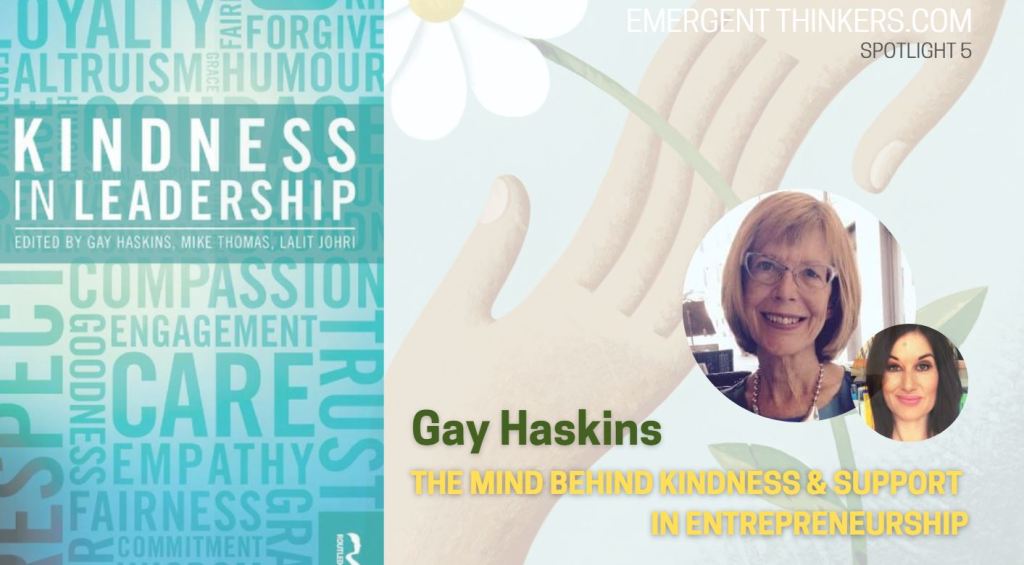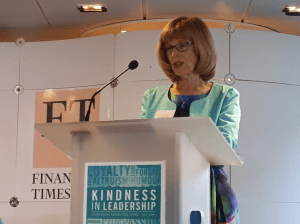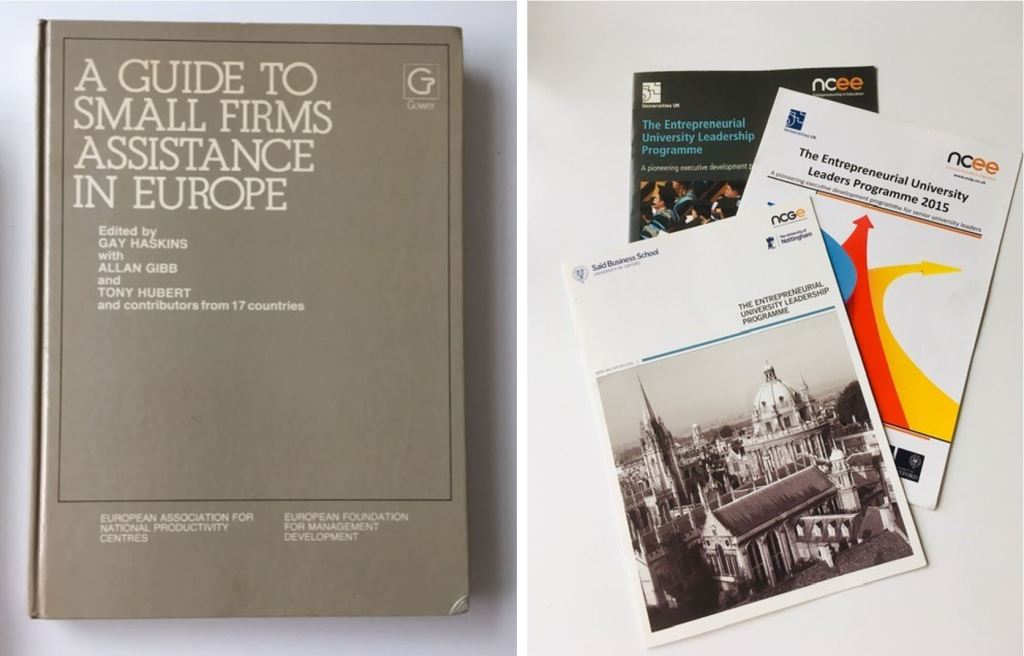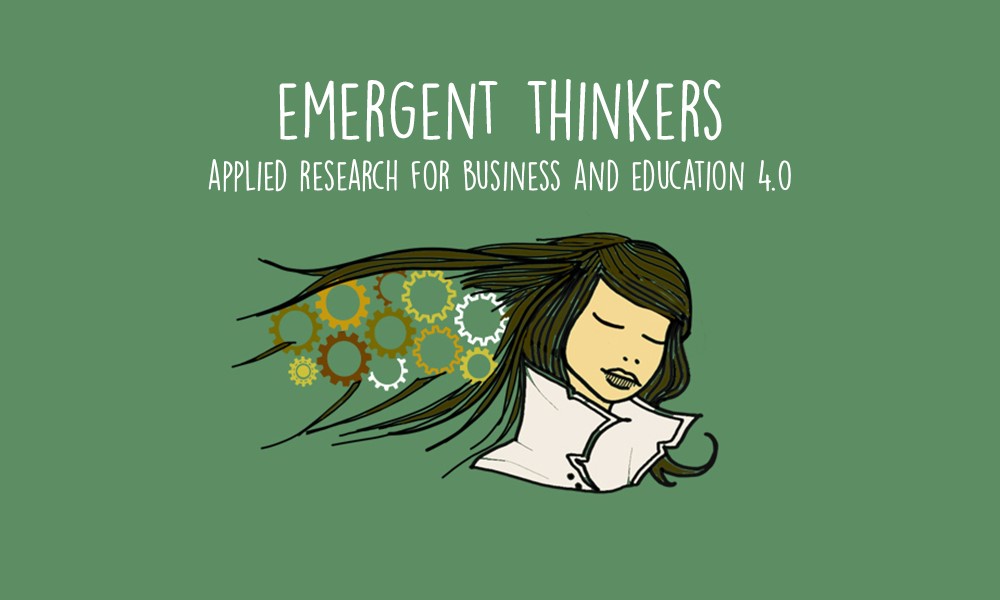
Gabrielle (Gay) Haskins has worked for forty years in the field of leadership and management development. Her key roles have been threefold: building networks (she was the first woman appointed as Director-General of the European Foundation for Management Development); leading the growth of Executive Education (at London Business School, Saïd Business School, University of Oxford and the Indian School of Business); and, designing and developing leadership programmes and international conferences (she was Director of Conferences for The Economist). Throughout her career, she has been involved in writing and editing: particularly in the areas of the social responsibility of business; management and leadership development; the entrepreneurial university and, most recently, kindness in leadership.
In your book ‘Kindness and Leadership’ (Routledge 2018) with Professor Mike Thomas and Professor Lalit Johri, you elevate the importance of the concept and practice of kindness in leadership, where did the idea originate?
It was a dark January day in 2013, and I was running the entrepreneurial university leadership programme in Oxford. We were having a break, and I got into a conversation with Professor Mike Thomas, who had just completed a paper on the fascinating topic of ‘grace in leadership’. In the course of his research, along with Professor Caroline Rowland, we noted that ‘kindness’ was hardly ever cited in the management literature. I concurred it was hardly ever mentioned in leadership classes either. The idea of a book was born!
In 2018, our book, ‘Kindness in Leadership’ materialised, drawing upon insights and experiences from contacts in leadership positions around the World. We found that being kind and caring towards the people you work with is extremely important, not in a weak way, but through fairness, consistency, honesty and respect. Creating a culture of kindness in the workplace increases commitment, motivation and trust. From interviews with leaders in both the private and public sectors, we identified several key behaviours of kind leaders: listening to others and respecting their views; communicating with a personal touch; celebrating and recognising achievement; accommodating personal issues; championing and encouraging others; being inclusive, caring and humane; and, perhaps, above all, truly believing in the value of kindness as an underlying philosophy for our lives and our work.

What was the most surprising thing you learnt from writing or connecting with others when writing the book?
That men generally say that women are kinder than men, and vice versa! But it is not so! The research shows that both genders can lead with kindness but that they tend to exemplify their kindness in different ways. Women may send cards, bring a cake into the office or celebrate birthdays, for instance. Men may not typically be offering the cup of coffee, but can be very good to come to for advice when times are tough. Men are every bit as kind as women, although there is a tendency for the two genders to demonstrate kindness differently.
Also, an unresolved question for me is whether kind acts are done out of pure kindness or out of a desire for reciprocal kindness. When one engages in a kind deed, is it purely for the other person, or to feel good within yourself? I want to think that kindness is always pure, but I still have to research the evidence. It’s a topic that philosophers have argued about a great deal!
Do you believe kindness is a trait or one can develop it?
I think it is a trait that we’re all born with, which can be weakened or strengthened over time. I genuinely believe if you practice the art of kindness, you will become kinder.
In organisational terms, how do you nurture a kindness culture?
A culture of kindness is grounded in people being honest, genuinely listening and caring, and the giving of time to others. It also required collaboration and teamwork together with the behaviours that I have already outlined. Without these, it’s impossible to build commitment and trust. In our book, we identify four areas in which kindness needs to be evident in organisations: in fair working conditions; through personal behaviours; at the organisational level; and towards customers/clients and the community.
If you could identify one single practice from the book that you could instantly hardwire into education design, which would it be, and why?
Starting with the youngest of children in primary schools, I would suggest a focus on ‘acts of kindness.’ Unlike compassion and empathy, which are feelings, kindness usually involves an act. I would encourage children to share their acts of kindness so that they become a central life philosophy. I’d encourage parents and teachers to ask, “Did you do anything to be kind to anyone today?”
When did you begin to be interested in entrepreneurship?
In the early 1980s when working for EFMD in Brussels, I was placed in charge of EFMD’s Small Business Network. This was a committed and colourful group of about twenty people involved in educating for enterprise and entrepreneurship across Europe, an area often overlooked by the business school community at that time. As well as running annual conferences on key issues in entrepreneurship and small business development, we published ‘A Guide to Small Firms Assistance in Europe’ (Gower, 1987). The book detailed the assistance provided in seventeen European countries. I helped edit the book along with Professor Allan Gibb, Director of the Small Business Centre at Durham University Business School and Tony Hubert, Secretary-General of the European Association of National Productivity Centres. This awakened an interest in entrepreneurship that would continue throughout my career.

I also developed an interest in entrepreneurial approaches to learning, and the need to change the way we engage our learners in the classroom. When I left school in 1962, I studied drama and enjoying children; I opted to train as a teacher. My three years at the New College of Speech and Drama in London were joyous! We read poetry and plays aloud and actively “felt” the meaning. Our classroom sparkled! I developed a great respect for the power of a mix of participative teaching methods, and the need to stimulate students and link their learning to their own frames of reference. Classrooms sparkle when full of the imagination and laughter too.
Returning to entrepreneurship, in 1987, when I was working at The Economist, I co-authored (with Roy Williams) a publication on ‘Intrapreneurship in Action’, the whys and the hows of making large organisations more entrepreneurial. A key focus was on developing the managerial mindsets, behaviours and competences that encourage innovation. So often, management processes can do quite the opposite!
Later, in 2010, when I was in charge of Executive Education in Oxford, the ‘Entrepreneurial University Leaders Programme’ was launched, as a joint venture between the Saïd Business School, University of Oxford, the National Centre for Entrepreneurship in Education (NCEE) and the University of Nottingham. It was the brainchild of Professor Allan Gibb, then Emeritus Professor of Durham University and aimed to help universities to think and act more entrepreneurially. It continues today, under the leadership of NCEE. Underpinned by several reports from NCEE, Allan’s thinking on this topic has been an inspiration to many. I have always been delighted to play a role in launching and subsequently, directing the programme.
Gay, you are a founding member of the European Women’s Management Development Network, why did you take steps to build a gendered support initiative?
In 1984, when I was working at the European Foundation for Management Development, I was asked, by Val Hammond, who was leading the research centre at Ashridge Management College to organise a meeting focussed on women’s management development. We contacted lots of women in different countries to join the inaugural meeting in Brussels. I recall so vividly, the volume, excitement and spirit in the room. A group of lively individuals who wanted to learn from each other, improve opportunities for women to flourish at work, and also live balanced and fulfilled lives. This birthed the European Women’s Development Network (EWMD) and, subsequently, many chapters across Europe.

How does the European Women’s Management Development Network make a difference to women?
The network provides women with a safe environment to share, talk through and address the problems and issues faced by women in the workplace. A great deal of mentoring and support is tendered or exchanged. It’s a very positive space for women to help each other flourish.
Has there been a specific opportunity or decision which has defined you, or shaped your career in some way?
Yes. In 1966, when I was leaving college, a Canadian friend said to me, “There is a world exposition in Montreal next year to mark the 100th year of Canada’s Confederation. Why not take some time off teaching and go there as a part of the British team?” I contacted the British Government and applied for a position as a hostess representing Britain at the British Pavilion in Expo ’67. This started my international journey with a bang! Sixty nations participated, and over 50 million people visited, and now cited as one of the most successful World Fairs of the 20th Century. And I fell in love with internationalism.

Expo 67: Gay meets the Queen
At Expo 67, a bright, intelligent young Californian was chatting to me in the Pavilion. In the course of our conversation, he said to me, “Why on earth don’t you go to University? Everyone in the US does!” Two years later, I was back in Montreal, as a student at McGill University, the start of my lifelong love affair with Canada. When opportunities come into your life, seize them. Be courageous and take risks.
You have an enviable catchy and infectious energy Gay, what drives your passion for the work you do?
Several things. In 1978, when I moved to Brussels with my husband, Jeffrey, it took me a long time to get a job, despite my recently acquired MBA. I had to search my mind for every possibility. After six months, I approached the European Institute for Advanced Studies in Management in Brussels. Professor Igor Ansoff was working there, and Igor had written a seminal book on business strategy. I plucked up all my courage and phoned him saying, “Look, you don’t know me, but I’m in Brussels, and I’ve just got an MBA, and I’m looking for work”. Anyway, the story concluded with a wonderful role managing a two-year pan-European project run by EFMD on the social responsibility of business – a new idea at that time. Working with the EFMD network was fantastic. So international. I became very interested in intercultural, cross-cultural relations. During my ten years in Brussels, for instance. I took part in the establishment of a business school in China, a Euro-Arab initiative in Grenada, and faculty exchange programmes with India. I became committed to a cross-cultural outlook and a convinced European.
Did any time spent in a specific country or culture group, change your thinking in any way?
I have been fortunate to travel to every continent of the world, to spend considerable time in Continental Europe, Canada and India. Exposure to different cultures was tremendously enrichening. Working in Brussels also gave me a tremendous respect for multilingualism. People jump from English to French to German to Spanish in the office. I think when you speak another language, you begin to adapt your personality to that culture. In our approach to education in the UK, we do tend to over pepper our examples and work with UK-centric thinking, and approach international development opportunities with a very Western perspective.
Gay, you have worked in many different types of organisations, contexts and countries. The arts, education, conference & event management, and management development. This has undoubtedly lain a strong foundation for your success in building global networks and a portfolio of international business school programmes. What legacy are you most proud of from your career to date?
I remember fondly the series of events that I ran honouring academic gurus in business when I was Director of Conferences at The Economist. Conferences featuring thinkers like Jay Conger, Peter Drucker, Sumantra Ghoshal, Charles Handy, Kenichi Ohmae, Tom Peters and Michael Porter, were a huge learning experience. Ultimately, I like to see myself as someone who has helped a little to champion innovative thinking in business and business schools and in leadership development. I’ve been fortunate to have had superb mentors, and have been keen to repay the investment.
Each of us in this world wants to leave it, thinking that we did one or two useful things for humanity. I don’t think I can or have changed the world, but I believe I have helped some of my dearest friends to enhance their careers because when working with them, I have always tried to listen and to support their development. I believe one of the most important human characteristics is to be humble. See yourself in the context of the whole of the world. We have to think about what success means in life. It doesn’t necessarily mean getting to the top of an organisation. My greatest joy comes from the relationships with all the people I’ve met. I have been blessed by working and meeting with so many inspirational people around the world and feel very fortunate.

Do you have an inspiration quote or piece of literature you frequently turn to or has influenced your thinking?
A deep love of drama and literature has permeated my life. I have just read George Eliot’s ‘Middlemarch’. She is a wonderful writer. So is Barack Obama and I am looking forward to getting into ‘The Promised Land’. For a quote….in the final chapter of ‘Kindness in Leadership, we quote Aesop’s Fables: “no act of kindness, no matter how small, is ever wasted”. Simple but powerful.
What life lessons would you emphasize for sharing?
- Seize opportunities. They can change your life.
- Mentors can be of great value – get some, and be one.
- Try to be a role model for others in your working life.
- As a leader, try to enhance the careers of those you work with.
- Be kind, caring, compassionate and fair.
Thank you, Gay, for a truly fascinating and depthful share of your life and career journey to date.


Thanks for a wonderful insight. Gay’s ‘soft’ approach to getting things done is something I have always admired. You know she cares and you know she listens, and you also know a new idea is hatching in her head as a result!
LikeLike
What a wonderful share, thank you Andy
LikeLike